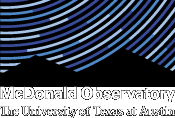CosmoQuest Partners, Including McDonald Observatory, Share $11.5 Million to Expand Astronomy Outreach Programs
11 March 2016
The CosmoQuest virtual research facility has been awarded an $11.5 million NASA grant to continue working with the public to explore the universe. The University of Texas at Austin’s McDonald Observatory is partnering with CosmoQuest on the project.
Launched in 2012, CosmoQuest brings together scientists, educators, and software developers from collaborating institutions to bring the public learning opportunities often only found in brick and mortar universities. Its programs range from science projects to science classes, and from planetarium shows to online seminars. Over five years, this $11.5 million award will allow the team to expand into new areas.
“With this funding, CosmoQuest will be able to grow from a seedling full of potential, into a mighty tree that supports science and learning opportunities,” said principal investigator and CosmoQuest leader Pamela Gay of Southern Illinois University Edwardsville. “We are bringing new partners with added expertise, and we couldn’t be prouder of this team.”
McDonald Observatory is one of the new partners.
“Educators and scientists from McDonald Observatory and the UT Austin Astronomy Department are excited to be a part of this NASA opportunity with CosmoQuest,” said astronomer Keely Finkelstein. “We will get to involve our scientists and students by working with the CosmoQuest team to create a new citizen project centered around dark energy.”
Discovered in 1999, dark energy is the enigmatic force causing the expansion of the universe to speed up over time. Scientists do not yet understand the nature of dark energy. Later this year, the Hobby-Eberly Telescope Dark Energy Experiment (HETDEX) will get under way at McDonald Observatory.
“We are eagerly awaiting the start of HETDEX,” Finkelstein said. “It will produce a tremendous wealth of data. Through our partnership with CosmoQuest, we can use the power of everyday citizens to help us examine the data from more than a million galaxies.
“I’m excited to continue to work with teachers and students and to have them be involved in all of the new exciting projects that will be produced as a part of this outstanding partnership between CosmoQuest and its many partner institutions,” Finkelstein said. “Teachers in Texas will be able to work with our education team to help pilot test some of these new projects, and bring them back to their classrooms and students."
Past CosmoQuest programs have helped the New Horizons team find Kuiper Belt Objects, and have helped researchers map out the Moon, Mars, Mercury, and Vesta, one of the largest main-belt asteroids.
Future programs will expand beyond planetary science. In addition to the dark energy collaboration with McDonald Observatory, Johnson Space Center will partner with CosmoQuest to help earth scientists more effectively use astronaut images to study our changing planet.
The NASA grant will fund CosmoQuest team members at the Astronomical Society of the Pacific, InsightSTEM, Interface Guru, Lawrence Hall of Science, Johnson Space Center, McREL International, the Planetary Science Institute, McDonald Observatory, and Youngstown State University.
— END —
Media Contact
Rebecca Johnson
The University of Texas at Austin
512-475-6763
Science Contacts
Dr. Keely Finkelstein
The University of Texas at Austin
512-471-3339
Dr. Pamela L. Gay
Southern Illinois University Edwardsville
617-307-6546





